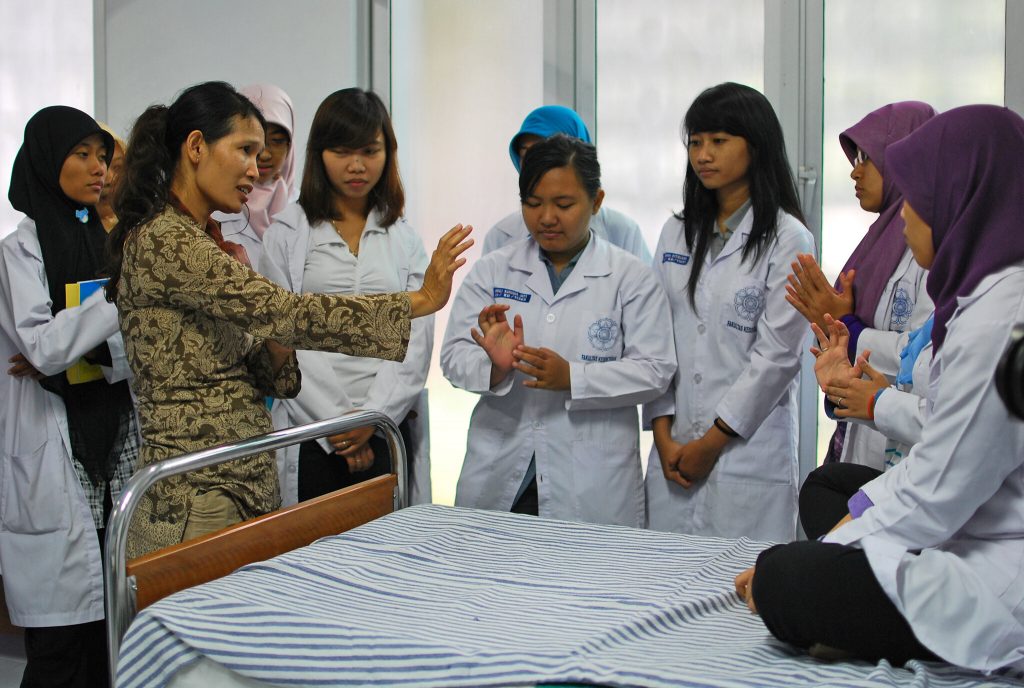GPSA projects
Women's Voices in the Monitoring and Improvement of Universal Healthcare Insurance Services
Country: Indonesia
Sector: Health
Executing Agency: AKATIGA Foundation
Grant Amount: $732,000
Closing Date: 2021


Frame and Challenge
Since 2007, Indonesia has emerged as a stable democracy and the largest economy in Southeast Asia. An annual GDP growth rate around 6% from 2005-2015 displays its strong and sustained economic growth, and has contributed to the emergence of a growing middle class. Human development indicators also show positive trajectories, with the poverty rate falling from 24% in 1999 to 11.4% in 2013 and life expectancy at birth jumping from 68 years in 2002 to 71 years in 2012. Despite such progress, the Indonesian economy remains vulnerable to external shocks, due to its heavy reliance on natural resources. The threats of higher interest rates from the United States, rebalancing and slowdown of the Chinese economy, and tighter financing conditions around the world have revealed significant structural weaknesses in the economy, and threaten to undo the poverty reduction achieved over the last decade.
Health outcomes and outputs in Indonesia have improved in recent years. However, challenges such as slow progress on maternal mortality and chronic malnutrition, as well as inequalities in health outcomes, remain. In addition, institutional capacity of local governments to plan, budget, provide, and regulate healthcare is a key constraint for efficient and effective use of funds. To remedy some of these issues, the government of Indonesia launched the Universal Health Care Insurance Services (UHCIS) in 2014, one of the largest single-payer social health insurance programs in the world. The insurance program currently carries over 140 million members and is expected to cover the total population by 2019. Interventions in the health sector must align with, contribute to, and inform the government’s ongoing reforms and sector policies.
Solution
The GPSA partnered with the AKATIGA Foundation, a group with extensive experience on project management and evaluation for public sector institutions and donors. AKATIGA also identified Mulsimat NU, the largest faith-based women's organization in Indonesia, as its main implementation partner. The objective of the project is to contribute to improving access to and quality of health services delivery for poor and vulnerable population in selected districts of Indonesia through a citizen feedback mechanism aimed to inform and support health providers' responsiveness and policy improvements at facility, district, and central levels.
This will be achieved with various actors on the part of multiple stakeholders, including:
- increasing poor and vulnerable health users' access to and effective utilization of the public health insurance system;
- generating timely and useful data on health users' utilization of services and linking it to service providers' management information systems; and
- engaging constructively with health service providers and public health institutions for collaborative problem-solving in health service delivery.
Outcomes
This project with the AKATIGA Foundation is recently underway in Indonesia. Projected and some early outcomes include:
- Generating feedback data directly from health insurance beneficiaries – particularly women – on the services they receive.
- Sharing health information with the Ministry of Health, Social Security Administration Agency, and the National Development Planning Agency to inform more accurate investment in the health sector.
- Health service providers, public health authorities, and patients are learning to engage directly and collaboratively to solve problems in health service delivery.
Lessons Learned
Ensuring the sustainable nature of this project required forethought and planning on maintained joint data collection from CSOs and health sector institutions to establish a reliable citizen feedback mechanism. This project expects to test and iterate a new mechanism that can generate data to be interfaced with health management information systems. This GPSA project was initiated in 2017; information on lessons learned will be posted as they become available.
Learn more
Click on the following links to learn more about the AKATIGA Foundation, related-GPSA work in the health sector, and project progress in Indonesia.
Website: AKATIGA Foundation
